This post has already been read 3714 times!
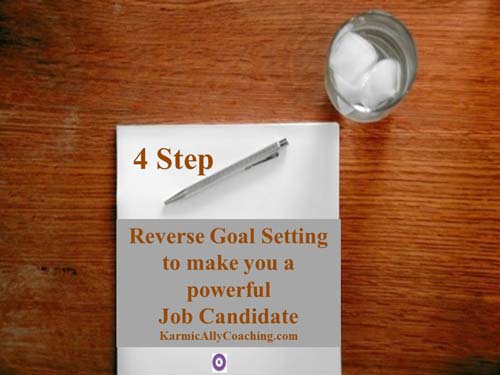
Has this ever happened to you? You’ve planned to achieve a goal (SMART Goal and the works) and done the required actions.
You’ve reached milestones along the way and actually getting close to goal achievement only to fail at the last hurdle?
It happens.
I’ve seen this more times than I can remember when it comes to job hunting whether it’s been my experience or that of others.
And it’s confusing. Especially if you’re on a job hunt, passing all the rounds only to get stumped at the final interview.
The head-hunter tells you that the prospective employer liked you but there was another stronger candidate who got the prize trophy – the job offer and appointment letter.
That’s exactly what happened with a professional who contacted me on LinkedIn looking for answers for failed last round interviews.
In her case, it wasn’t a one off but a series of interviews for jobs where she appeared to be well-qualified and then losing out in the final round.
This lady is a complete stranger and I don’t know her which made it difficult to assess if she was doing something wrong or dig into the deeper issues.
Since she wasn’t interested in talking to me and was looking for a Band-Aid solution. She didn’t understand that there could be deeper issues or the fact that she was positioning herself as a commodity.
The only suggestions I could give her were to get feedback from the head-hunter who was sending her for interviews, reflect on what could be a common factor in all these failed interviews and fix it.
That seemed to be her quick fix solution and hopefully she’ll get the job next time round.
But there is more to nailing the final job interview in a market where there is no dearth of talent. One simply has to stand out from the noise at each step of the job hunt process starting right from the job application to the last round.
It requires shifts in behaviour and especially mind-set to emerge a winner.
If you too have had this experience, then this post is meant for you. I’m outlining a 4-step reverse goal setting process that will improve your chances of getting the job.
A different approach to goal achievement – Reverse Engineering
In goal setting, whether it’s for a new job or desired results, most of us normally begin building our plan from start to finish that would move us from Point A to Point B.
We set up the S.M.A.R.T Goal, outlining the steps we’d take as well as the date by which each step would need to be completed.
In essence we create a forward-looking plan.
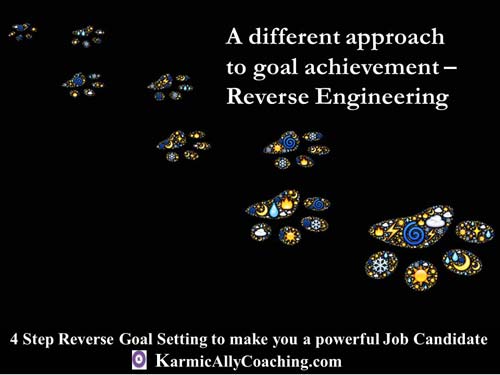
With reverse goal setting or goal engineering, we aren’t simply reversing the direction of the plan but are adopting a different perspective to enable us to identify what it’s actually going to take to achieve our desired result.
Instead of looking at chronological steps first, we look at the activities we need to do and then put them in a chronological order.
It changes our perspective because we might discover there are steps where more effort or research is required in the goal achievement process.
This approach ties up with out of the box thinking and is a complementary resource to traditional goal setting because it provides us with more alternatives and a robust plan of action to achieve the end result.
There are different approaches to reverse goal setting depending upon the goal to be achieved.
It could be a case of outlining milestones that will lead to the final outcome or prioritizing activities and then taking action to achieve them.
Here’s how I would approach it using the example of performing well in the final interview round.
Step 1: Begin with the end in mind – what’s your ultimate goal?
This step is no different from the traditional goal planning method because in order to achieve a goal, we need to determine what our desired end result is.
We need to determine the outcome and a specific date of completion and then move to the second step.
In our final interview round example, we’d state our ultimate goal as
By X date, I will have an appointment letter for Y job.
Considering that we need to take into account factors that are outside our control or sphere of influence, let’s rephrase it to a more realistic goal
By X date, I will give an interview that makes me the most viable candidate for the job and the hiring company considers my candidature seriously.
Step 2: The Brain Dump
The next step is to get all the ideas that you have to achieve your goal down in writing and organize them.
Get a piece of paper and pen or open a document on your computer and set the timer for 15 minutes.
During these 15 minutes write down every idea you have to achieve the goal.
Don’t stop to consider if it’s a good idea or not or whether it’s a workable idea. That comes later. Right now, we need to brainstorm on what possible actions we can take to achieve our goal.
Now look at the list and sort out the activities that are doable and will help you get to your goal and those that while they sound good on paper are not feasible for the goal or not that important.
Make as good a note as you can about the time and resources you will need for each activity.
Transfer the doable ones which you think are important on a clean sheet of paper.
In our example the brainstorming ideas could include:
Read the papers for any news about the company
Find out more about the interviewing team
Get teeth cleaned by a dentist before final round so I have a shiny toothy smile (grooming for executive presence)
Research the company for details that I can use to show I’m aware about their corporate culture
What kind of questions can I be asked, how do I prepare for them?
How can I demonstrate Executive Presence? (The checklist and extra tips in the below freebie answers this question)
Step 3: Prioritize your activities
Armed with our list, the next step is to prioritize our activities and list them in the order that we need to achieve them.
Think about creating a starting outline to begin the sequencing.
Each of these activities might require being set up as mini-goals in which case, subject them to the SMART Goal layout. These will also become your milestones if required.
In our example, it would be the activities and things we need to do to prepare for the interview.
Step 4: Implementing our goal based strategy
We know our goal and priority of our activities. We also have timelines for each activity.
Ask yourself what top priority milestone or activity you need to accomplish, in order to achieve your ultimate goal. What do you have to do and by when, so that you’re in a position to reach your final objective.
It is much easier to create your calendar by working backwards – keeping the end in mind.
- Identify the date by which your goal should be completed.
- Identify the last step you must do before the goal’s due date.
- Identify the next to the last step; the third to the last, and continue until you finish putting all the steps in reverse order.
It’s possible that you might have to move the steps around until you create your final plan of action.
In our example, it is obviously to give an excellent final round interview that makes us the most viable candidate but we need to prepare for the final interview.
In the following section, I’m going to share 4 suggestions about the preparation for the final interview which should appear in your brainstorming step as well as in your implementation step.
4 Prep for Success Interview Questions you need to Nail
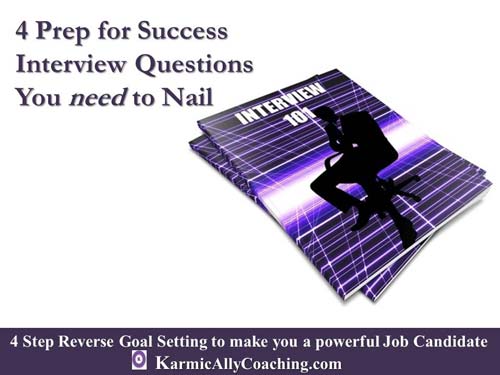
Position yourself apart from the crowd
This comes back to standing out from above the noise and being noticed by the interviewers as having something more to offer.
Considering everyone who has applied for the job had the same qualifications and those with better credentials and experience have also reached the final round, how will you position yourself?
The short answer is to avoid positioning yourself as a commodity but as a resource that will give the employer a high ROI.
Get clear on the message that you want to convey in the final round and the skills that you bring to the table that nobody else will.
Research and understand the problems that the prospective employer has and demonstrate your strengths as well as USP (Unique Selling Proposition) to solve those problems.
Get feedback and support from your head-hunter or referral source
I recommend preparing for the interview by checking in with the recruiter or referral about the nature of the interview. Ask for any specific information that can help you.
Every company conducts final interviews differently and it’s better to be prepared.
Will there be a personality assessment? A Group setting? Anything that you need to pay attention to?
Once you know you’ve made it to the final round, ask the recruiter questions like
What advice do you have for me going into the final interview?
Don’t get fobbed off with advice like be yourself. You need to know which strengths are to be highlighted as well as the interview format so you come in prepared.
Prepare for the cultural fit question
Cultural fit is an important factor nowadays and you might be asked this question.
It’s time to do some due diligence on the company and their culture.
Prepare for this question by reaching out to your network for people who know about the company.
Check them out on Google and LinkedIn for any information that can give you insights. (This blog post has more ideas for the due diligence sources)
Being technically competent for the job might not be enough.
Your answers should demonstrate your awareness about the company’s vision, mission and other information. Show how you would adapt quickly to the workplace.
How will you handle the compensation question?
This question often comes up at the final interview. You need to be prepared to answer it even if the recruiter has already shared the salary range.
Compensation is only one factor in changing jobs. Gain a handle on what you earn so you can provide it to the potential employer upfront when they ask about your Cost to Company (CTC). Many of the job adverts also talk in terms of CTC.
Your compensation is not just your salary but all the other benefits that you receive. Different companies have different compensation programs and some of them can be quite complicated.
Nevertheless, some idea is better than no idea. Some of the considerations include your base salary, band increments, bonus, employee stock options, restricted stock units, profit sharing distributions, overtime compensation, annual paid leave, medical leave, health insurance cover and other related insurance programs, car loans, car allowances, corporate credit card, superannuation, pension fund.
Research what compensation packages are offered in your industry for the position you are being interviewed for.
Nowadays, a Google search or looking at industry specific websites can provide you with the additional information.
Don’t worry if you don’t have an exact figure. You need to simply have a good figure to compare with any job that you decide to target or get interviewed for.
Also consider asking questions about the package that is being offered and be open to negotiation.
Your turn, how do you prepare for the final interview round?


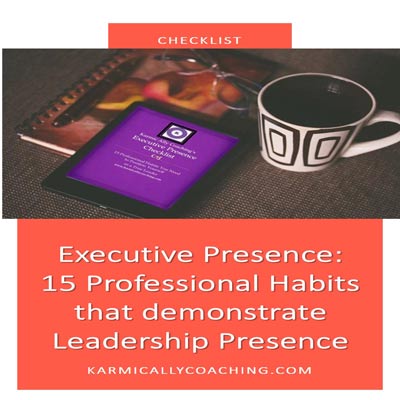

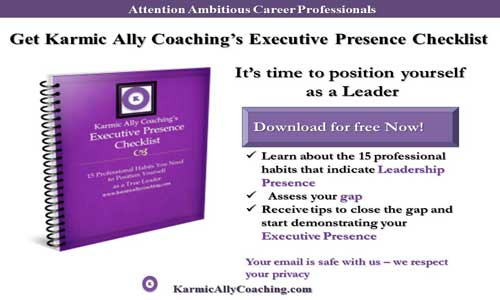

 I adhere to the Certified Coaches Alliance Code of Ethics and Standards. A copy is available on request.
I adhere to the Certified Coaches Alliance Code of Ethics and Standards. A copy is available on request.
 Let's Talk through the Connect Form:
Let's Talk through the Connect Form:
Love Yvonne’s comments- go for it . I do set goals/ intentions and being laser focussed on my vision. I do follow those 4 steps. I now work with a daily method of operation where i do reward myself when i have been able to check off my daily task that are moving me closer to my 90 days Goal/intention . So long since I applied for a Job , but brilliant for those who are thank you for sharing your wisdom xxoo
I love the idea of rewards when one checks off a daily task. It is a small but powerful motivator to get to the main goal.
I agree with Yvonne, above, that this would make a great freebie. It’s so comprehensive and helpful for anyone facing the prospect of job interviews. I really appreciate the idea of reverse engineering – having that end goal up front as a North Star is so important in staying focussed and staying in alignment with one’s ultimate goal.
Thanks Reba. I have other posts as well as an ebook on interviews and perhaps I will update the ebook to incorporate the guidance.
Vatsala, this is a great post that could easily qualify as a tutorial for your market. I can see this as a booklet you give out at networking events and to recruiters. Amazing content! Really like how you covered all the details.
You’ve made my day, Yvonne! Thank you for the idea- I might just incorporate it into my freebies. 🙂
Vatsala, Love how you have detailed the reverse engineering process for getting to your goals. You have made the steps easy to follow.
Thanks Livvie. I try to simplify things so my readers have no excuse not to take action to solve their problems and get support for their challenges.
Thanks for a great post, Vatsala! Preparing for the final interview is indeed a task to be taken seriously. My final preparation just before the interview would be to do some meditation or breathing exercises to calm the nerves, so I can put my best foot forward at the interview!
Brilliant idea, Vanita! Staying grounded and composed is crucial for the last round interview. I would go as far as to suggest one starts the grounding process a few days before the interview to create the right mindset. Thanks for sharing your insight.